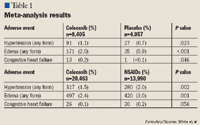- Safety & Recalls
- Regulatory Updates
- Drug Coverage
- COPD
- Cardiovascular
- Obstetrics-Gynecology & Women's Health
- Ophthalmology
- Clinical Pharmacology
- Pediatrics
- Urology
- Pharmacy
- Idiopathic Pulmonary Fibrosis
- Diabetes and Endocrinology
- Allergy, Immunology, and ENT
- Musculoskeletal/Rheumatology
- Respiratory
- Psychiatry and Behavioral Health
- Dermatology
- Oncology
COX-2 inhibitor demonstrates lower incidence of adverse cardiorenal events compared with nonselective NSAIDs
A meta-analysis of data from randomized, parallel-designed, placebo-controlled studies involving >44,000 patients demonstrated that those who had taken the cycloxygenase-2 (COX-2) inhibitor celecoxib (50–800 mg TDD) had a lower incidence of adverse cardiorenal events including hypertension, edema, or congestive heart failure than those taking nonselective non-steroidal anti-inflammatory drugs (NSAIDs), according to an oral and poster presentation at the 21st annual scientific meeting of the American Society of Hypertension (ASH) in New York, NY.
A meta-analysis of data from randomized, parallel-designed, placebo-controlled studies involving >44,000 patients demonstrated that those who had taken the cycloxygenase-2 (COX-2) inhibitor celecoxib (50–800 mg TDD) had a lower incidence of adverse cardiorenal events including hypertension, edema, or congestive heart failure than those taking nonselective non-steroidal anti-inflammatory drugs (NSAIDs), according to an oral and poster presentation at the 21st annual scientific meeting of the American Society of Hypertension (ASH) in New York, NY.

At baseline, the majority of patients in the placebo, celecoxib, and NSAID groups were female and received treatment for the indication of osteoarthritis/rheumatoid arthritis. Thirty-one percent of patients in studies comparing celecoxib and placebo received treatment for ≥12 weeks, 3% received treatment for ≥24 weeks, 3% received treatment for ≥36 weeks, and 2% received treatment for ≥52 weeks. Fifty-five percent of patients in studies comparing celecoxib and NSAIDs were treated for ≥12 weeks, 15% received treatment for ≥24 weeks, 12% received treatment for ≥36 weeks, and 4% received treatment for ≥52 weeks.
"While a relatively high number of patient-years of treatment exposure were accumulated, much of exposure in individual trials was of relatively short duration," the authors stated in their presentation at ASH's meeting (May 2006). "Thus, exposure duration in any individual may not have been sufficient, on average, to permit development of adverse outcomes."
Sufficient data to compare rates of adverse cardiorenal events among the NSAID group and the placebo group were not available.
SOURCES White WB, Simon LS, MacDonald TM, et al. Effects of celecoxib on cardiorenal adverse events: meta-analysis of 41 clinical trials in over 44,000 patients. Presented at: the 21st annual scientific meeting of the American Society of Hypertension; May 16–20; New York, NY. Abstract MP-54.
FDA Approves Combination Therapy for Pulmonary Arterial Hypertension
March 25th 2024J&J’s Opsynvi is single-tablet combination of macitentan, an endothelin receptor antagonist, and tadalafil, a PDE5 inhibitor. It will be priced on parity with Opsumit, which is also a J&J product to treat patients with PAH.
FDA Issues Complete Response Letter for Onpattro in Heart Failure Indication
October 9th 2023Alnylam Pharmaceuticals will no longer pursue this indication of Onpattro and will instead on focus on a label expansion for Amvuttra, which is in phase 3 development to treat patients with cardiomyopathy of ATTR amyloidosis.
